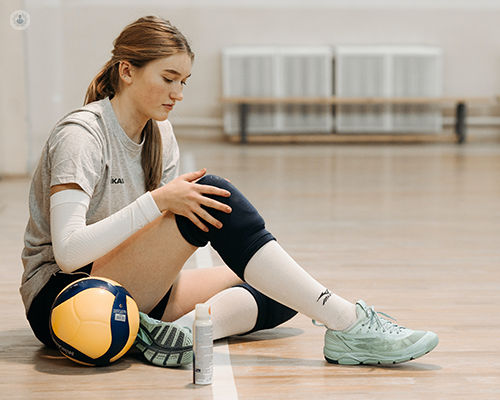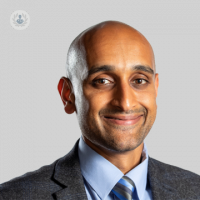ACL injuries: what you need to know
Written by:The anterior cruciate ligament (ACL) is a key component in the middle of the knee which prevents the tibia (shin bone) from sliding forward onto the femur (thigh bone). However, it is vulnerable to tear and sprain, resulting in “ACL injuries”.
Mr Akash Patel, highly skilled consultant trauma and orthopaedic surgeon, explains when ACL injuries commonly occur and how they are managed.

How do ACL injuries most commonly occur?
Injuries to the ACL can occur in a number of different ways. When they occur, patients may experience knee pain, swelling and a ‘pop’. They are more common during sporting activity and may cause knee instability and pain, with a risk of knee degeneration. This usually happens when the mechanism of injury involves a non-contact pivoting or twisting knee movement, but a blow to the knee may also cause these.
Common activities related to ACL injuries include football, skiing, rugby, basketball and martial arts. Other associated injuries may also occur, including damage to the meniscal cartilage (‘shock absorber’) and/or other ligaments.
What are the most effective treatment options? Which is the most recommended?
The most effective management depends on appropriate patient assessment and identification of injury. Correct diagnosis is obviously key in determining the best treatment.
Treatment options for ACL injuries consist of non-operative and operative measures. Non-operative treatments include activity modification, physiotherapy rehabilitation, painkillers, lifestyle changes and knee bracing. Surgical options include ACL reconstruction using grafts. The most commonly used grafts are either hamstrings or the patella tendon taken from the patient’s own leg, but various surgical reconstruction methods and grafts are available.
The recommended treatment is determined after a full patient review, investigations (such as an MRI scan) and a discussion between the doctor and patient.
Can someone really ever fully recover from an ACL injury?
Complete ACL tears do not usually ‘heal’ fully, but recovery from ACL injury is usually very good if the patient has had appropriate assessment and management. In any case, physiotherapy is key, regardless of non-operative and operative options.
With ACL reconstruction surgery, patients can return to sporting activities. However, the level of recovery depends upon the patient and the nature of injury. Patients with ACL tears are at risk of instability and knee degeneration in the long term.
When is surgery considered?
Surgery is not always required for ACL tears. It will be considered depending on a patient’s activity level, age, symptoms of instability (giving way), other concomitant knee injuries and the patient’s wishes. Surgical treatment is always individualized.
What would the typical recovery time from an ACL injury entail?
The recovery time for an ACL injury is variable, depending on non-operative or operative treatment.
Physiotherapy rehabilitation and normal return to function after ACL injury can take six to twelve months. If surgery is undertaken, this is usually a day-case procedure, with the patient walking, potentially with crutches, and discharged, the same day.
Mr Akash Patel is a highly skilled, experienced consultant trauma and orthopaedic surgeon based in London, who specialises in the ACL alongside sports injuries. If you have recently had an ACL injury and would like to seek expert assessment for it, make sure to visit Mr Patel's Top Doctors profile today.


